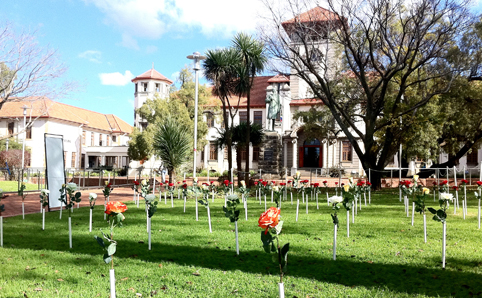Latest News Archive
Please select Category, Year, and then Month to display items
07 January 2018
Photo Charl Devenish
 Dr Anneke van der Spoel van Dijk is invested in contributing
to the global effort of stopping TB by 2035.
Dr Anneke van der Spoel van Dijk is invested in contributing
to the global effort of stopping TB by 2035.
The work of Dr Anneke van der Spoel van Dijk investigates the spread of TB in the Free State population using techniques such as next generation sequencing, spoligotyping and MIRU-VNTR typing. Dr Van der Spoel van Dijk, a senior medical scientist in the Department of Medical Microbiology at the University of the Free State (UFS) also looks at drug resistance in her research. This work informs decisions about how best to treat patients with multidrug-resistant TB (MDR-TB).
She employs rapid molecular techniques to track one of Africa’s most serious diseases, tuberculosis (TB).
Drug resistance
Scientists assist the National Health Laboratory Service and Department of Health in trying to refine the diagnostic tools to identify these cases earlier. Dr Van der Spoel van Dijk explains: “Until recently, it took up to two years to fine-tune treatment decisions for patients with MDR-TB. Patients get a cocktail of anti-TB drugs, but it takes time to find the right combination. Re-infection and relapse (patients stopping treatment for several reasons) add to the diagnostic and treatment management challenges.
Enormous impact
“Now doctors can reduce the time needed for diagnostic certainty to about seven days, while new drugs allow reduction of treatment from more than 18 to nine months. This can have an enormous impact on the life of many patients.”
Dr Van der Spoel van Dijk’s work forms part of research in the faculty looking at resistance development in TB strains. She is currently also doing her doctoral thesis on the differences and incidence of MDR-TB among adolescents versus adults. Dr Van der Spoel van Dijk says: “It is a complicated picture, but we hope to unravel it to support better diagnostic tools and patient care.”
As part of the National Health Laboratory Service, her department is playing an important role in TB diagnostics and the training of scientists and future pathologists. “Our work is contributing to the global vision to stop TB by 2035,” Dr Van der Spoel van Dijk says.
“Month of Compassion”
2011-05-24
 |
|
Hundred roses were planted in front of our Main Building
Photo: Duard Grobbelaar
|
The Health and Wellness Centre at our university recently planted roses on the Main Campus in memory of people who passed away in the past year due to some illnesses and other personal issues.
Each rose represented 2 550 South Africans who have passed away and 100 roses were planted in front of the Main Building on our Main Campus. There were 51 red roses which represented deaths due to HIV, 14 yellow roses for those who passed away due to ischemic heart disease, 13 white roses for deaths caused by stroke, 11 orange roses for deaths caused by turbeculosis and 11 pink roses for deaths caused by interpersonal violence.
The rose garden managed to draw a lot of attention and people, many of which were members of our own staff and several students, actually took time from their busy schedules to have a look at its spectacular beauty.